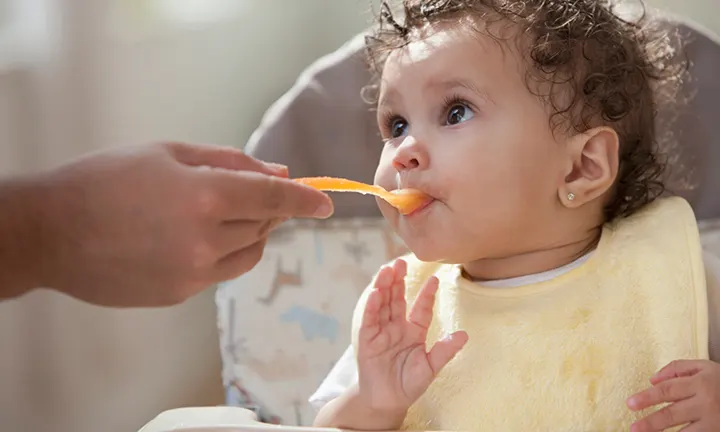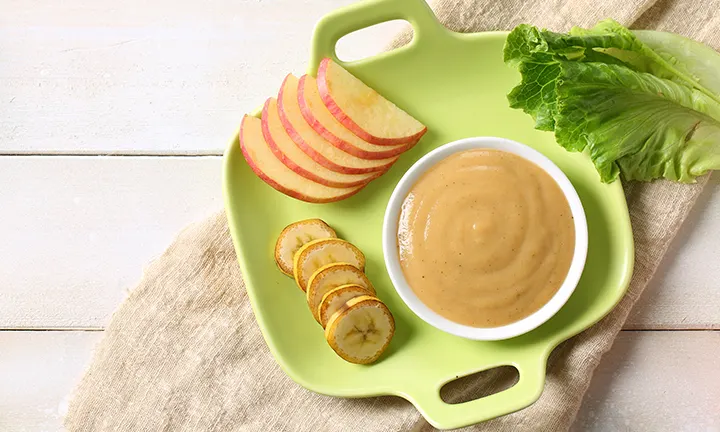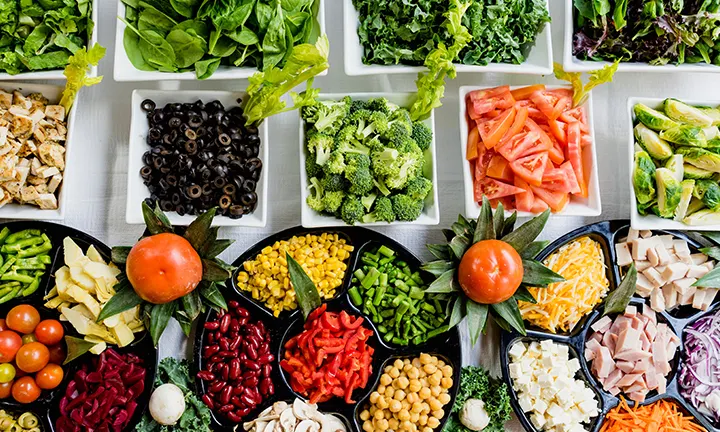Safe Baby Food Chart For 4-12 Month Olds
Babies are delicate and therefore it is necessary to take care of them from the moment they begin their journey in the mother’s womb. A baby’s diet and nutrition highly depends upon the mother’s diet, hobbies, activities and more. However, some kids are born healthier than others but that does not mean any compromise can be made on the baby’s diet even if they’re born healthy. Thus, the diet and nutrition of a baby is of utmost importance from the time they’re born.
When a child is born, it is most likely to gain weight more than it’d been born within 4 to 5 months of age. The same goes for height. If the baby has been receiving supplements, then it’ll reflect on his or her growth and development. This way, number triples as the baby slowly turns 1 year old.
Let’s take a look at a baby’s food chart on a month on month:
4 Months Old Baby Food Chart
Grains:
Single grain cereals
Fruits & Veggies:
Banana, Avocado, Sweet Potato, and Apple
6 Months Old Baby Food Chart
Grains & Pulses:
Black, Red and Pinto Beans, Lentils
Fruits & Veggies:
Carrots, Peas, Potatoes, Mangoes, Peaches, Plums, and Apricot
Meats:
Turkey, Tofu, and Chicken
9 Months Old Baby Food Chart
Grains & Pulses:
Pasta and Millets
Fruits & Veggies:
Cauliflower, Eggplant, Beets, Berries, Cucumber, Melons, Coconuts, and Figs
Meat & Dairy:
Fish, Eggs, Yogurt, Pasteurized Cheese including paneer
12 Months Old Baby Food Chart
Grains & Pulses:
All grains and pulses are safe
Fruits & Veggies:
Mosambis, Oranges, Strawberries, Corn, Spinach, and Tomatoes
Dairy:
Cow milk
The chart above gives an overview of a baby’s diet on a monthly basis. The introduction of solid foods marks a major milestone in a child’s diet plan. And based on the little one’s readiness, many parents begin feeding solid food to their baby only at 4 months of age. However, ensure that you consult a doctor before introducing any new food to your munchkin.
The required Nutrition for Each Month of Development
For the baby to be healthy, parents should be inclined to giving the little one a balanced diet. This means a balanced diet consisting of sufficient nutrients that every child would need on a daily basis:
1. Proteins:
It helps in building a child’s body cells and fight infection and carry oxygen.
2. Carbohydrates:
Although, the current trend is to cut the carbs, carbohydrates act as one of the body’s vital source of energy. They aid a child’s body to use protein and fat for repairing and building tissues.
3. Fats:
They are a vital source of energy for kids. They easily get stored in a child’s body and supports the body to carefully use some of the other nutrients it requires.
4. Calcium:
Like they say, the healthier the bones, the healthier you. Calcium helps in building a child’s healthy teeth and bones. Besides, it is also important for the proper functioning of the muscle, nerve, and heart.
5. Iron:
Who doesn’t want their baby to have a high concentration of healthy blood? Well, iron-rich foods are there to do that job quite well. Iron builds healthy blood in a child’s body that carries oxygen to cells throughout the body.
6. Folate:
For those to-be moms, consuming folate can be of extreme value to their babies. Being high in Vitamin B, folate facilitates healthy growth and development of a child’s cells.
7. Fiber:
Giving foods that are rich in fiber produces bowel regularity in a child. It also reduces the chances of cancer and heart diseases later in life.
8. Vitamin A:
Vitamin A has multifarious benefits for a mother and a child alike. It promotes growth, assists eyes in adjusting to bright and dim lights, prevents infection and keeps skin healthy.
9. Vitamin C:
This vital vitamin plays a significant role other than fighting off the common cold. It strengthens blood vessels, holds body cells together, heals body wounds, and importantly builds strong bones and teeth.
Now that you know which vital nutrition to provide to your baby while they’re in the growing stage, here are the names of food items that will definitely fulfill your little one’s nutrition requirements.
Cereals, grains, and pulses:
Cereals have a good amount of starch and that makes them an excellent source of energy. Rice being an allergen-free food, it is easy to digest.
Fruits:
Fruits are excellent sources of vitamins and are extremely nutritious. To name a few, bananas, apples, avocados, plums, and strawberries are few fruits bearing high vitamins.
Vegetables:
Bearing a rich content of Vitamin A and Beta Caratone, carrots are high-profile vegetables that’ll boost your baby’s growth. Besides, they are a good source of fiber for your little one.
Dairy:
Milk is a superfood for babies as its rich in all vitamins and minerals.
Proteins:
Eggs, meat, fish, tofu, and yogurt contain a high content of proteins that’ll help in building and maintaining your baby’s tissues and organs. It also helps in building immunity.
Thus, the importance of good food lays a heavy impact on your baby’s development. Good nutrition and diet drive a speedy development of the body and brain, and it starts even before the baby is conceived. Now here with all the awareness about a baby’s food chart, mothers can exult in joy and before you know it, you’ll have a baby as healthy and fit as an athlete.
Cheers! ☺




